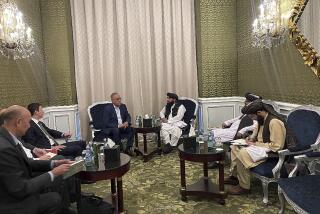Women’s Forum Delegates Urge Focus on Issues
- Share via
BEIJING — Concerned that complaints of heavy-handed security procedures are overshadowing the important issues of the U.N. Fourth World Conference on Women, prominent delegates urged Sunday that attention be refocused on the meeting itself.
U.S. Health and Human Services Secretary Donna Shalala, a delegate to the conference, said that, although police harassment and surveillance of some participants are unacceptable, it is time to get back to work on advancement of women’s concerns.
“Most of the delegates have faced bigger problems in their own countries than they have in Beijing. They are pros who are not going to let these side issues distract them,” she said.
On Saturday, the organizing committee of the Non-Governmental Organizations Forum on Women gave their Chinese counterparts 24 hours to tone down the intense police presence after some participants protested that police and plainclothes security people were shadowing, photographing and intimidating them.
Although police agreed to reduce their numbers, the harassment continued Sunday, and forum leaders announced they will seek mediation. U.N. Undersecretary General Ismat Kittani, however, implied that the United Nations is not going to push the Chinese government.
“There are problems, such as problems about security, but we have this everywhere,” he told the official New China News Agency. “I’m optimistic that once we get down to business [today], many of these problems would have been solved and you can concentrate on the conference,” he said.
Police pressure has been focused on a handful of active human rights groups that China considers a threat to its national interests. The forum site--in the isolated suburb of Huairou, an hour’s drive north of Beijing--is supposed to be a sanctuary protected by U.N. rules, not Chinese laws, which forbid criticism of government policies and unapproved demonstrations.
Nine exiled Tibetan women who are protesting human rights abuses in their Chinese-controlled homeland have been particular targets of police attention. “They have been followed, shadowed, recorded and videotaped from the moment they leave their hotel in the morning to the moment they return at night,” said Reed Brody, a representative from the International Campaign for Tibet.
Police also seized materials about forced sterilization in Tibet from Canadian lawyer Eva Herzer on Sunday, the day after organizers met with the Chinese Organizing Committee to demand an end to such interference. “The harassment is supposed to be stopped, but I think that the U.N. and the NGO have no idea how to control security at the conference,” Herzer said.
But on the eve of the official conference opening and First Lady Hillary Rodham Clinton’s arrival as the honorary head of the U.S. delegation, the mood seemed to be shifting away from initial gripes to the nitty-gritty of the 150-page Platform of Action they are here to create.
While international delegates will initially debate bracketed words and phrases in the document that signify much larger disagreements over abortion and sex education, for instance, Shalala urged everyone to “look outside the brackets.”
The delegates will be confirming advances in women’s health and education and working to halt violence against women. “There are big issues at hand here,” she said.
More to Read
Sign up for Essential California
The most important California stories and recommendations in your inbox every morning.
You may occasionally receive promotional content from the Los Angeles Times.













